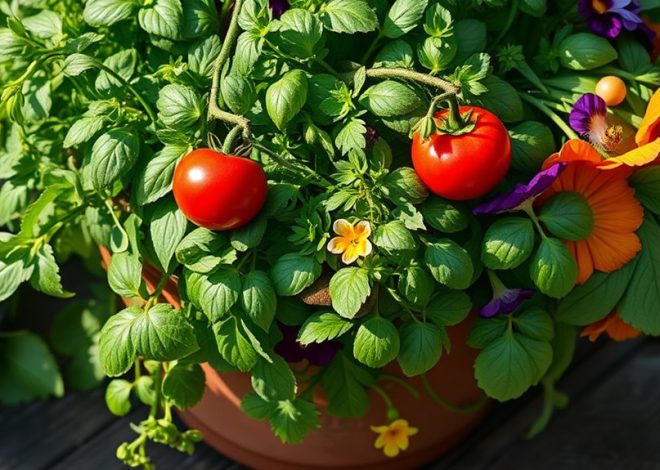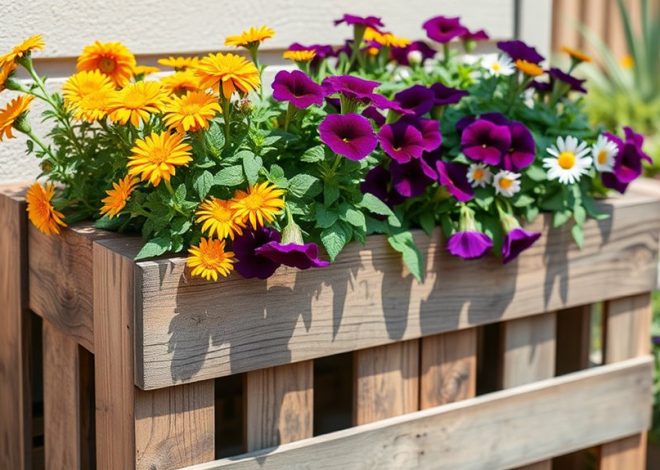
This Container Garden Trick Keeps Pests Out for Good
This Container Garden Trick Keeps Pests Out for Good
If you’ve ever noticed aphids overtaking your tomato plants, you know the frustration of pest invasions. Fortunately, there’s a proven method to keep these nuisances at bay while enhancing your garden’s health. By combining companion planting with natural deterrents, you can create an environment that discourages pests effectively. Curious about how to implement this strategy for a thriving container garden? The solution lies in understanding the right plants and practices to adopt.
Key Takeaways
- Regularly inspect plants for early signs of pests like discolored leaves or sticky residue to catch infestations quickly.
- Utilize natural pest deterrents such as neem oil or garlic spray to repel unwanted insects effectively and eco-friendly.
- Implement companion planting strategies, pairing plants like marigolds with tomatoes to deter pests and enhance growth.
- Maintain soil health through regular testing, compost incorporation, and crop rotation to prevent pest infestations from soil-borne diseases.
- Install physical barriers like mesh screens, row covers, or sticky traps to protect container plants from various pests.
Understanding Common Container Garden Pests
Container gardens can be a delight, but they often attract a variety of pests that can threaten your plants. Understanding these common pests is crucial for maintaining a healthy garden. Aphids, spider mites, and whiteflies are notorious for infesting container plants, sucking their nutrients and causing damage. Recognizing their early signs can help you implement an effective container pest solution. Regularly check your plants for discolored leaves or sticky residue, as these are telltale signs of infestation. Implementing natural pest control methods can enhance your efforts in keeping your container garden thriving.
Natural Pest Deterrents for Your Garden
How can you protect your container garden from pests without resorting to harsh chemicals?
You can use natural deterrents that are effective and eco-friendly.
Consider these options:
- Neem Oil: This natural pesticide disrupts insect life cycles, keeping infestations at bay.
- Diatomaceous Earth: Sprinkle this powder around your plants to create a barrier that’s lethal to soft-bodied insects.
- Garlic Spray: Blend garlic with water and spray it on your plants to ward off pests with its strong scent. Additionally, homemade garlic pest spray is an effective solution that utilizes the natural properties of garlic to repel a variety of garden pests.
Companion Planting: A Strategic Approach
Integrating companion planting into your garden strategy can enhance pest control while promoting plant health.
By strategically pairing plants, you can create a natural ecosystem that deters pests and encourages beneficial insects.
For instance, planting marigolds alongside tomatoes can repel nematodes, while basil enhances the flavor of tomatoes and wards off pests. This method also utilizes companion herb planting to improve overall garden resilience and productivity.
This synergy maximizes space and resources, ultimately leading to a more productive garden.
Choose companions wisely based on their complementary traits, and watch as your plants thrive together.
Embracing this method not only reduces reliance on chemical pesticides but also fosters a sustainable gardening environment.
Maintaining Soil Health to Prevent Infestations
Healthy soil is the foundation of a thriving garden and plays a crucial role in preventing pest infestations.
To maintain soil health, you should focus on:
- Regular Testing: Conduct soil tests to monitor pH and nutrient levels, ensuring your plants get what they need.
- Organic Matter: Incorporate compost or other organic materials to improve soil structure and enhance microbial activity.
- Crop Rotation: Change the plants you grow each season to disrupt pest life cycles and reduce soil-borne diseases.
Additionally, utilizing a budget-friendly soil mix can significantly enhance the productivity and health of your container garden.
Creating Physical Barriers Against Pests
Creating effective physical barriers against pests is essential for protecting your container garden. You can use various materials to deter unwanted visitors, ensuring your plants thrive. Here’s a quick reference table:
| Barrier Type | Effectiveness |
|---|---|
| Mesh Screens | Blocks insects |
| Row Covers | Shields from pests |
| Copper Tape | Repels slugs/snails |
| Garden Netting | Prevents bird damage |
| Sticky Traps | Captures crawling pests |
Implementing these barriers not only protects your plants but also reduces the need for chemical treatments, promoting a healthier garden environment. Additionally, utilizing natural pest barriers can be an eco-friendly approach to safeguarding your garden.



